NURS6055 Assignment: Mental Health Acute Care Case Study Analysis
VerifiedAdded on 2022/12/27
|9
|2278
|96
Case Study
AI Summary
This case study delves into the complexities of mental health acute care, focusing on a patient, Mr. A, with a history of diabetes, depression, and various psychosocial challenges. The study meticulously outlines Mr. A's background, including family conflicts, professional difficulties, and the impact of losing loved ones, leading to social withdrawal and difficulties managing his daily life. It presents the patient's current scenario, including physical and mental health symptoms, and the diagnostic process. The assignment also includes a detailed analysis of the patient's vulnerabilities and strengths, clinical reasoning, and context of admission to acute care. The study uses the provided references to support the analysis and recommendations for the patient's care.
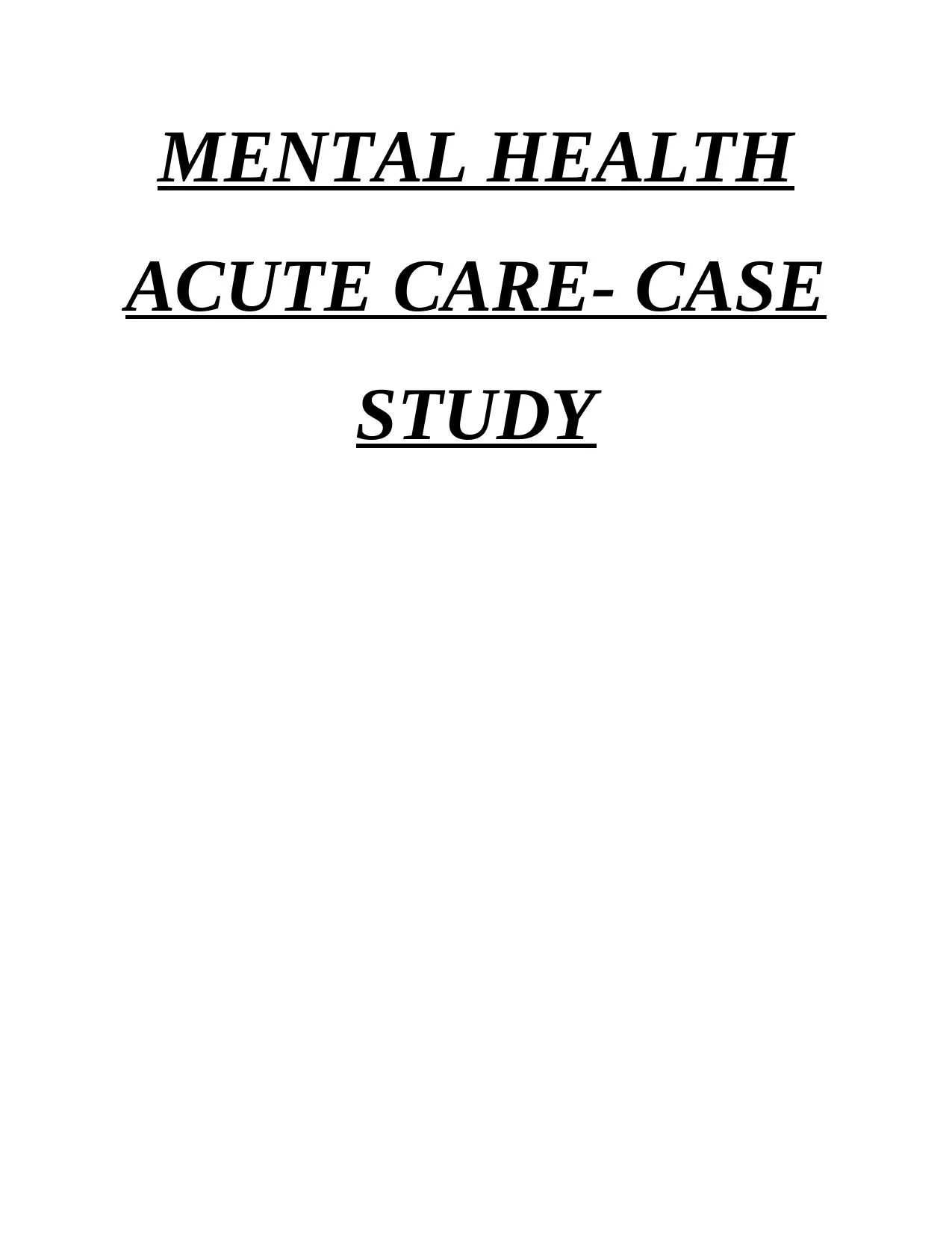
MENTAL HEALTH
ACUTE CARE- CASE
STUDY
ACUTE CARE- CASE
STUDY
Paraphrase This Document
Need a fresh take? Get an instant paraphrase of this document with our AI Paraphraser
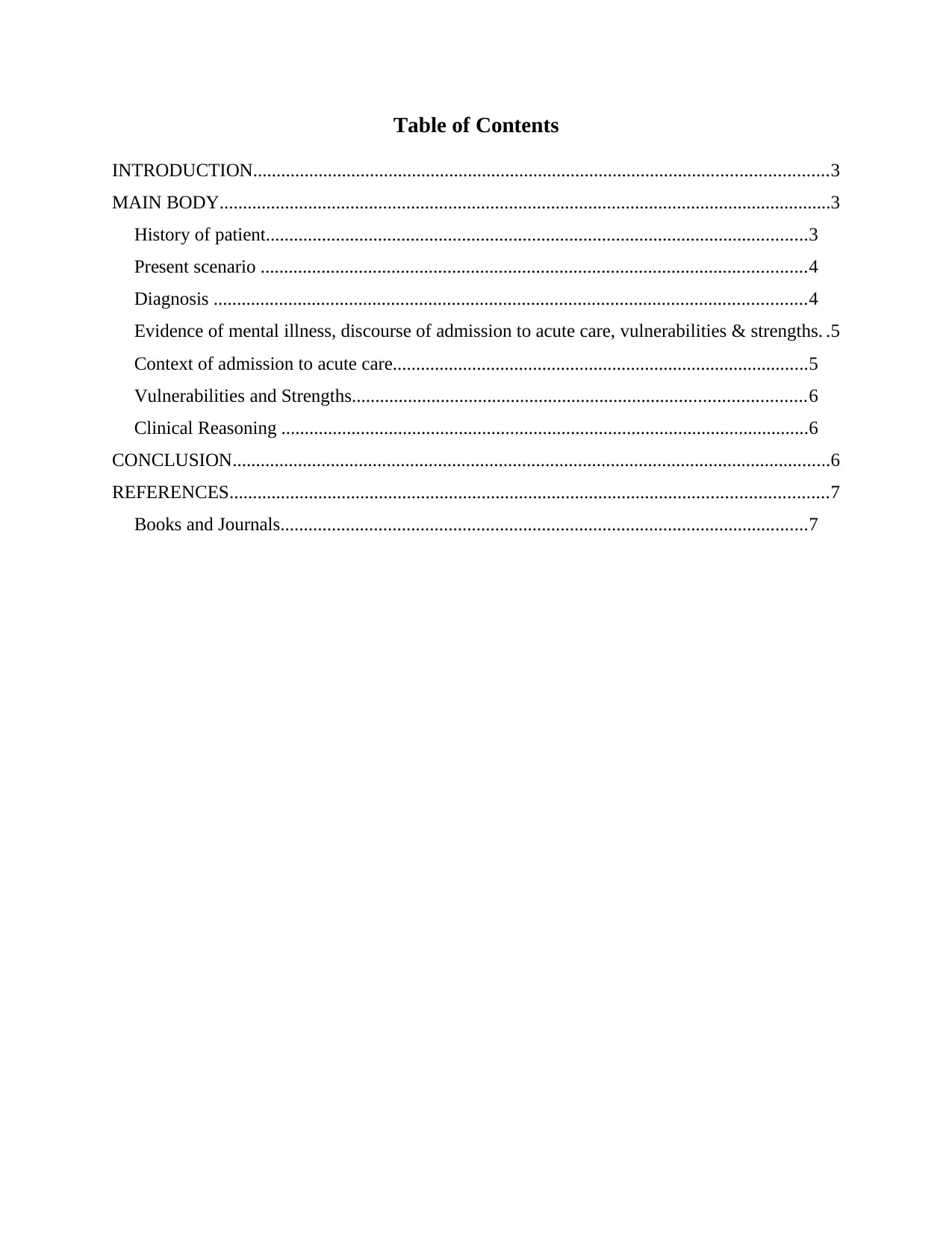
Table of Contents
INTRODUCTION...........................................................................................................................3
MAIN BODY...................................................................................................................................3
History of patient....................................................................................................................3
Present scenario .....................................................................................................................4
Diagnosis ...............................................................................................................................4
Evidence of mental illness, discourse of admission to acute care, vulnerabilities & strengths. .5
Context of admission to acute care.........................................................................................5
Vulnerabilities and Strengths.................................................................................................6
Clinical Reasoning .................................................................................................................6
CONCLUSION................................................................................................................................6
REFERENCES................................................................................................................................7
Books and Journals.................................................................................................................7
INTRODUCTION...........................................................................................................................3
MAIN BODY...................................................................................................................................3
History of patient....................................................................................................................3
Present scenario .....................................................................................................................4
Diagnosis ...............................................................................................................................4
Evidence of mental illness, discourse of admission to acute care, vulnerabilities & strengths. .5
Context of admission to acute care.........................................................................................5
Vulnerabilities and Strengths.................................................................................................6
Clinical Reasoning .................................................................................................................6
CONCLUSION................................................................................................................................6
REFERENCES................................................................................................................................7
Books and Journals.................................................................................................................7
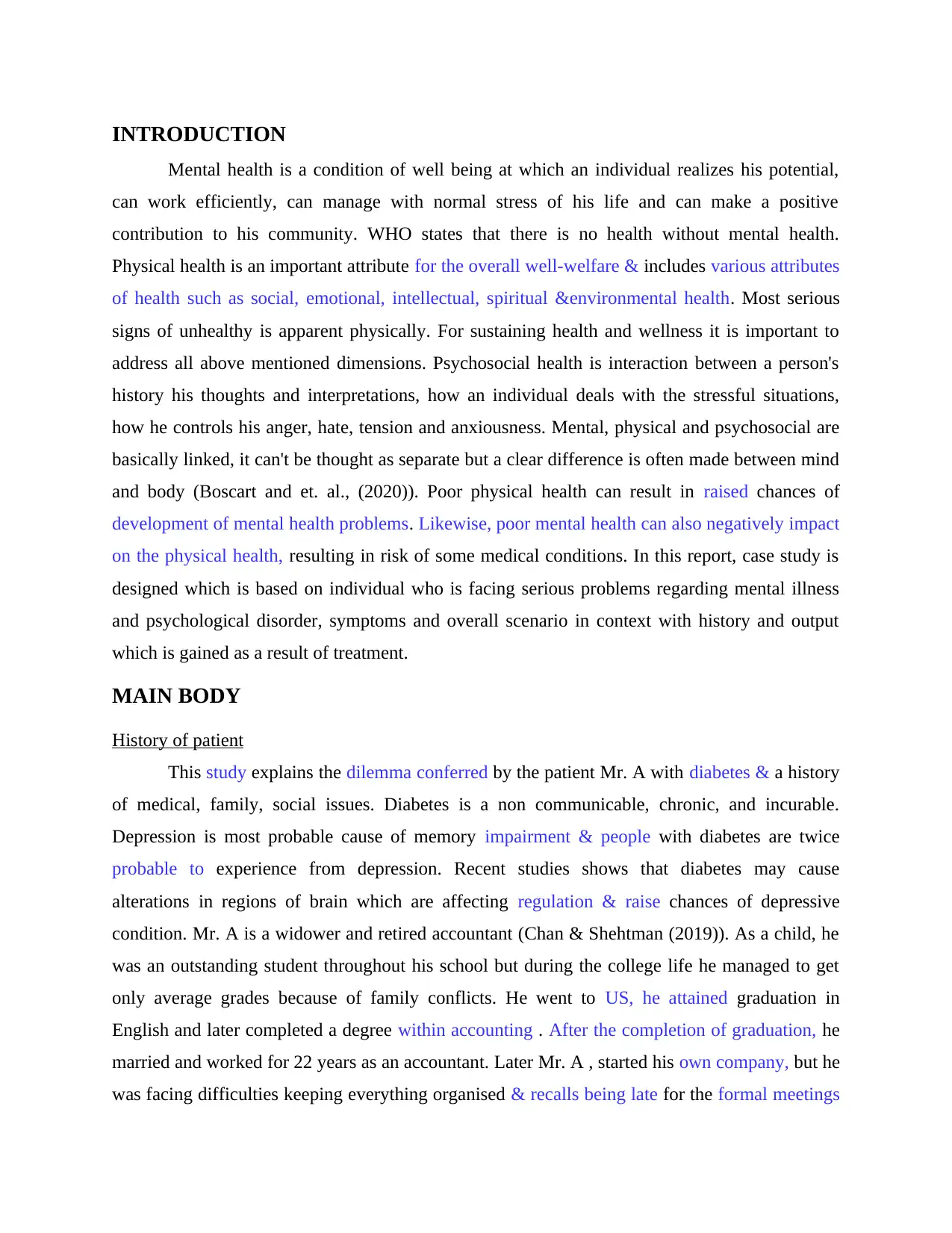
INTRODUCTION
Mental health is a condition of well being at which an individual realizes his potential,
can work efficiently, can manage with normal stress of his life and can make a positive
contribution to his community. WHO states that there is no health without mental health.
Physical health is an important attribute for the overall well-welfare & includes various attributes
of health such as social, emotional, intellectual, spiritual &environmental health. Most serious
signs of unhealthy is apparent physically. For sustaining health and wellness it is important to
address all above mentioned dimensions. Psychosocial health is interaction between a person's
history his thoughts and interpretations, how an individual deals with the stressful situations,
how he controls his anger, hate, tension and anxiousness. Mental, physical and psychosocial are
basically linked, it can't be thought as separate but a clear difference is often made between mind
and body (Boscart and et. al., (2020)). Poor physical health can result in raised chances of
development of mental health problems. Likewise, poor mental health can also negatively impact
on the physical health, resulting in risk of some medical conditions. In this report, case study is
designed which is based on individual who is facing serious problems regarding mental illness
and psychological disorder, symptoms and overall scenario in context with history and output
which is gained as a result of treatment.
MAIN BODY
History of patient
This study explains the dilemma conferred by the patient Mr. A with diabetes & a history
of medical, family, social issues. Diabetes is a non communicable, chronic, and incurable.
Depression is most probable cause of memory impairment & people with diabetes are twice
probable to experience from depression. Recent studies shows that diabetes may cause
alterations in regions of brain which are affecting regulation & raise chances of depressive
condition. Mr. A is a widower and retired accountant (Chan & Shehtman (2019)). As a child, he
was an outstanding student throughout his school but during the college life he managed to get
only average grades because of family conflicts. He went to US, he attained graduation in
English and later completed a degree within accounting . After the completion of graduation, he
married and worked for 22 years as an accountant. Later Mr. A , started his own company, but he
was facing difficulties keeping everything organised & recalls being late for the formal meetings
Mental health is a condition of well being at which an individual realizes his potential,
can work efficiently, can manage with normal stress of his life and can make a positive
contribution to his community. WHO states that there is no health without mental health.
Physical health is an important attribute for the overall well-welfare & includes various attributes
of health such as social, emotional, intellectual, spiritual &environmental health. Most serious
signs of unhealthy is apparent physically. For sustaining health and wellness it is important to
address all above mentioned dimensions. Psychosocial health is interaction between a person's
history his thoughts and interpretations, how an individual deals with the stressful situations,
how he controls his anger, hate, tension and anxiousness. Mental, physical and psychosocial are
basically linked, it can't be thought as separate but a clear difference is often made between mind
and body (Boscart and et. al., (2020)). Poor physical health can result in raised chances of
development of mental health problems. Likewise, poor mental health can also negatively impact
on the physical health, resulting in risk of some medical conditions. In this report, case study is
designed which is based on individual who is facing serious problems regarding mental illness
and psychological disorder, symptoms and overall scenario in context with history and output
which is gained as a result of treatment.
MAIN BODY
History of patient
This study explains the dilemma conferred by the patient Mr. A with diabetes & a history
of medical, family, social issues. Diabetes is a non communicable, chronic, and incurable.
Depression is most probable cause of memory impairment & people with diabetes are twice
probable to experience from depression. Recent studies shows that diabetes may cause
alterations in regions of brain which are affecting regulation & raise chances of depressive
condition. Mr. A is a widower and retired accountant (Chan & Shehtman (2019)). As a child, he
was an outstanding student throughout his school but during the college life he managed to get
only average grades because of family conflicts. He went to US, he attained graduation in
English and later completed a degree within accounting . After the completion of graduation, he
married and worked for 22 years as an accountant. Later Mr. A , started his own company, but he
was facing difficulties keeping everything organised & recalls being late for the formal meetings
⊘ This is a preview!⊘
Do you want full access?
Subscribe today to unlock all pages.

Trusted by 1+ million students worldwide
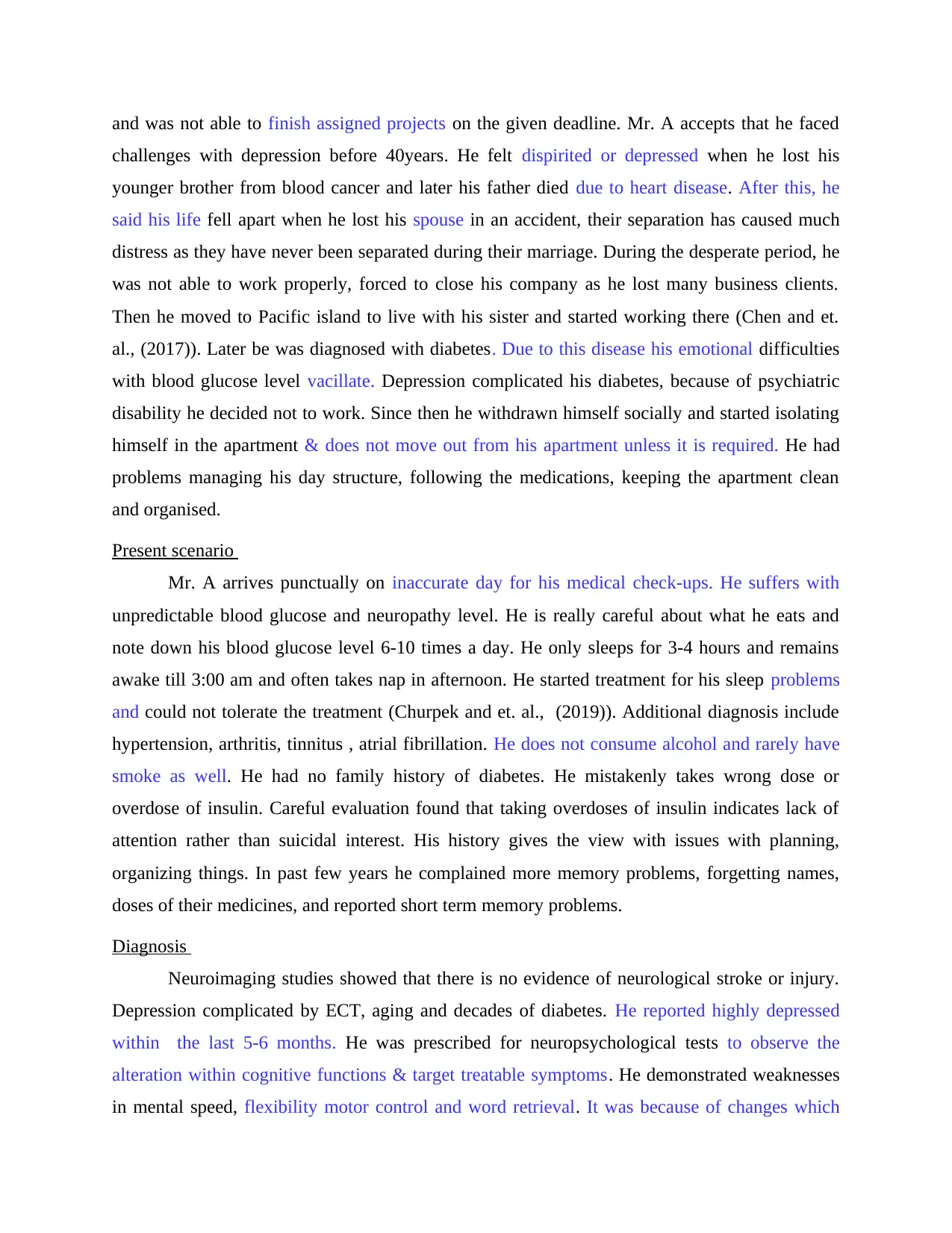
and was not able to finish assigned projects on the given deadline. Mr. A accepts that he faced
challenges with depression before 40years. He felt dispirited or depressed when he lost his
younger brother from blood cancer and later his father died due to heart disease. After this, he
said his life fell apart when he lost his spouse in an accident, their separation has caused much
distress as they have never been separated during their marriage. During the desperate period, he
was not able to work properly, forced to close his company as he lost many business clients.
Then he moved to Pacific island to live with his sister and started working there (Chen and et.
al., (2017)). Later be was diagnosed with diabetes. Due to this disease his emotional difficulties
with blood glucose level vacillate. Depression complicated his diabetes, because of psychiatric
disability he decided not to work. Since then he withdrawn himself socially and started isolating
himself in the apartment & does not move out from his apartment unless it is required. He had
problems managing his day structure, following the medications, keeping the apartment clean
and organised.
Present scenario
Mr. A arrives punctually on inaccurate day for his medical check-ups. He suffers with
unpredictable blood glucose and neuropathy level. He is really careful about what he eats and
note down his blood glucose level 6-10 times a day. He only sleeps for 3-4 hours and remains
awake till 3:00 am and often takes nap in afternoon. He started treatment for his sleep problems
and could not tolerate the treatment (Churpek and et. al., (2019)). Additional diagnosis include
hypertension, arthritis, tinnitus , atrial fibrillation. He does not consume alcohol and rarely have
smoke as well. He had no family history of diabetes. He mistakenly takes wrong dose or
overdose of insulin. Careful evaluation found that taking overdoses of insulin indicates lack of
attention rather than suicidal interest. His history gives the view with issues with planning,
organizing things. In past few years he complained more memory problems, forgetting names,
doses of their medicines, and reported short term memory problems.
Diagnosis
Neuroimaging studies showed that there is no evidence of neurological stroke or injury.
Depression complicated by ECT, aging and decades of diabetes. He reported highly depressed
within the last 5-6 months. He was prescribed for neuropsychological tests to observe the
alteration within cognitive functions & target treatable symptoms. He demonstrated weaknesses
in mental speed, flexibility motor control and word retrieval. It was because of changes which
challenges with depression before 40years. He felt dispirited or depressed when he lost his
younger brother from blood cancer and later his father died due to heart disease. After this, he
said his life fell apart when he lost his spouse in an accident, their separation has caused much
distress as they have never been separated during their marriage. During the desperate period, he
was not able to work properly, forced to close his company as he lost many business clients.
Then he moved to Pacific island to live with his sister and started working there (Chen and et.
al., (2017)). Later be was diagnosed with diabetes. Due to this disease his emotional difficulties
with blood glucose level vacillate. Depression complicated his diabetes, because of psychiatric
disability he decided not to work. Since then he withdrawn himself socially and started isolating
himself in the apartment & does not move out from his apartment unless it is required. He had
problems managing his day structure, following the medications, keeping the apartment clean
and organised.
Present scenario
Mr. A arrives punctually on inaccurate day for his medical check-ups. He suffers with
unpredictable blood glucose and neuropathy level. He is really careful about what he eats and
note down his blood glucose level 6-10 times a day. He only sleeps for 3-4 hours and remains
awake till 3:00 am and often takes nap in afternoon. He started treatment for his sleep problems
and could not tolerate the treatment (Churpek and et. al., (2019)). Additional diagnosis include
hypertension, arthritis, tinnitus , atrial fibrillation. He does not consume alcohol and rarely have
smoke as well. He had no family history of diabetes. He mistakenly takes wrong dose or
overdose of insulin. Careful evaluation found that taking overdoses of insulin indicates lack of
attention rather than suicidal interest. His history gives the view with issues with planning,
organizing things. In past few years he complained more memory problems, forgetting names,
doses of their medicines, and reported short term memory problems.
Diagnosis
Neuroimaging studies showed that there is no evidence of neurological stroke or injury.
Depression complicated by ECT, aging and decades of diabetes. He reported highly depressed
within the last 5-6 months. He was prescribed for neuropsychological tests to observe the
alteration within cognitive functions & target treatable symptoms. He demonstrated weaknesses
in mental speed, flexibility motor control and word retrieval. It was because of changes which
Paraphrase This Document
Need a fresh take? Get an instant paraphrase of this document with our AI Paraphraser
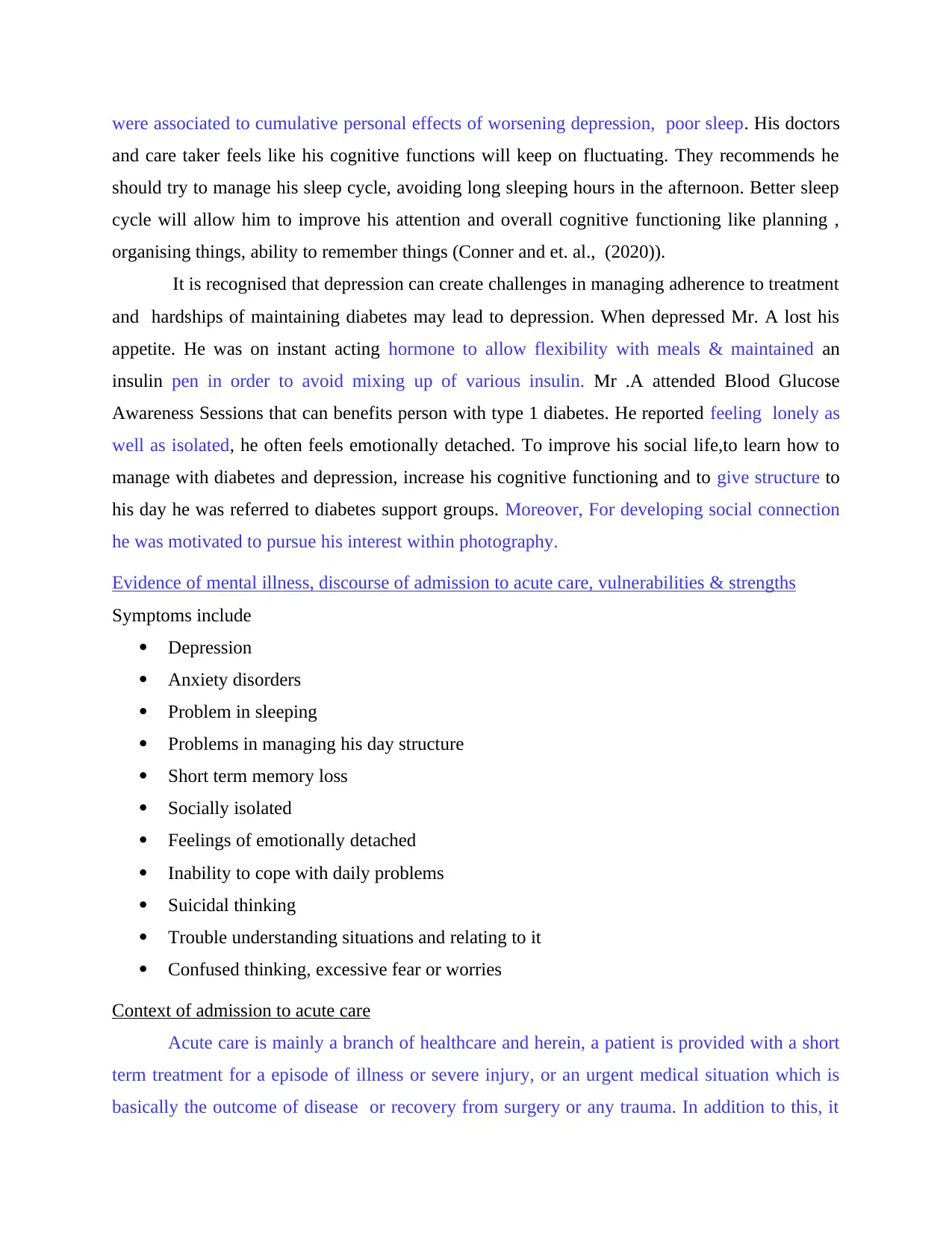
were associated to cumulative personal effects of worsening depression, poor sleep. His doctors
and care taker feels like his cognitive functions will keep on fluctuating. They recommends he
should try to manage his sleep cycle, avoiding long sleeping hours in the afternoon. Better sleep
cycle will allow him to improve his attention and overall cognitive functioning like planning ,
organising things, ability to remember things (Conner and et. al., (2020)).
It is recognised that depression can create challenges in managing adherence to treatment
and hardships of maintaining diabetes may lead to depression. When depressed Mr. A lost his
appetite. He was on instant acting hormone to allow flexibility with meals & maintained an
insulin pen in order to avoid mixing up of various insulin. Mr .A attended Blood Glucose
Awareness Sessions that can benefits person with type 1 diabetes. He reported feeling lonely as
well as isolated, he often feels emotionally detached. To improve his social life,to learn how to
manage with diabetes and depression, increase his cognitive functioning and to give structure to
his day he was referred to diabetes support groups. Moreover, For developing social connection
he was motivated to pursue his interest within photography.
Evidence of mental illness, discourse of admission to acute care, vulnerabilities & strengths
Symptoms include
Depression
Anxiety disorders
Problem in sleeping
Problems in managing his day structure
Short term memory loss
Socially isolated
Feelings of emotionally detached
Inability to cope with daily problems
Suicidal thinking
Trouble understanding situations and relating to it
Confused thinking, excessive fear or worries
Context of admission to acute care
Acute care is mainly a branch of healthcare and herein, a patient is provided with a short
term treatment for a episode of illness or severe injury, or an urgent medical situation which is
basically the outcome of disease or recovery from surgery or any trauma. In addition to this, it
and care taker feels like his cognitive functions will keep on fluctuating. They recommends he
should try to manage his sleep cycle, avoiding long sleeping hours in the afternoon. Better sleep
cycle will allow him to improve his attention and overall cognitive functioning like planning ,
organising things, ability to remember things (Conner and et. al., (2020)).
It is recognised that depression can create challenges in managing adherence to treatment
and hardships of maintaining diabetes may lead to depression. When depressed Mr. A lost his
appetite. He was on instant acting hormone to allow flexibility with meals & maintained an
insulin pen in order to avoid mixing up of various insulin. Mr .A attended Blood Glucose
Awareness Sessions that can benefits person with type 1 diabetes. He reported feeling lonely as
well as isolated, he often feels emotionally detached. To improve his social life,to learn how to
manage with diabetes and depression, increase his cognitive functioning and to give structure to
his day he was referred to diabetes support groups. Moreover, For developing social connection
he was motivated to pursue his interest within photography.
Evidence of mental illness, discourse of admission to acute care, vulnerabilities & strengths
Symptoms include
Depression
Anxiety disorders
Problem in sleeping
Problems in managing his day structure
Short term memory loss
Socially isolated
Feelings of emotionally detached
Inability to cope with daily problems
Suicidal thinking
Trouble understanding situations and relating to it
Confused thinking, excessive fear or worries
Context of admission to acute care
Acute care is mainly a branch of healthcare and herein, a patient is provided with a short
term treatment for a episode of illness or severe injury, or an urgent medical situation which is
basically the outcome of disease or recovery from surgery or any trauma. In addition to this, it
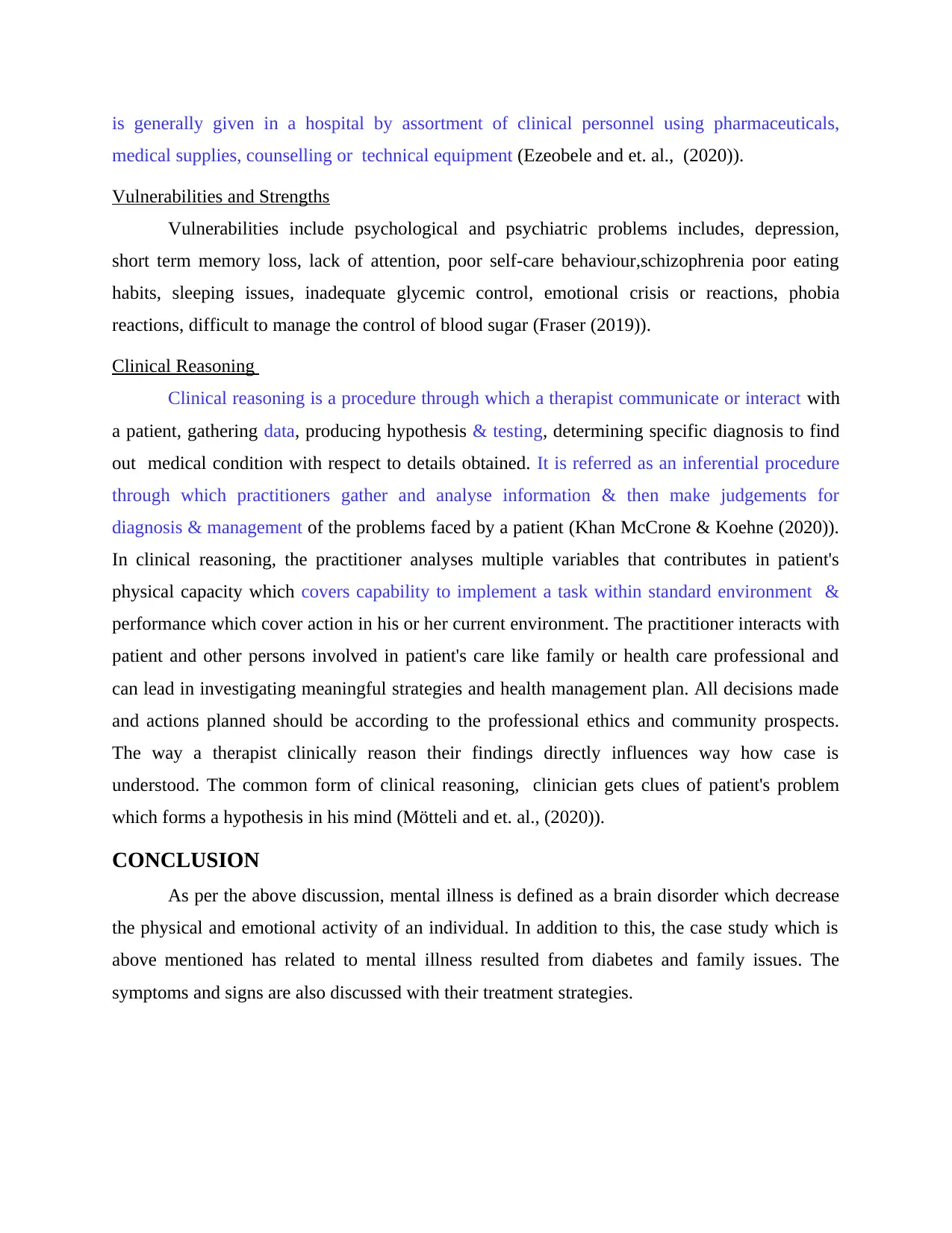
is generally given in a hospital by assortment of clinical personnel using pharmaceuticals,
medical supplies, counselling or technical equipment (Ezeobele and et. al., (2020)).
Vulnerabilities and Strengths
Vulnerabilities include psychological and psychiatric problems includes, depression,
short term memory loss, lack of attention, poor self-care behaviour,schizophrenia poor eating
habits, sleeping issues, inadequate glycemic control, emotional crisis or reactions, phobia
reactions, difficult to manage the control of blood sugar (Fraser (2019)).
Clinical Reasoning
Clinical reasoning is a procedure through which a therapist communicate or interact with
a patient, gathering data, producing hypothesis & testing, determining specific diagnosis to find
out medical condition with respect to details obtained. It is referred as an inferential procedure
through which practitioners gather and analyse information & then make judgements for
diagnosis & management of the problems faced by a patient (Khan McCrone & Koehne (2020)).
In clinical reasoning, the practitioner analyses multiple variables that contributes in patient's
physical capacity which covers capability to implement a task within standard environment &
performance which cover action in his or her current environment. The practitioner interacts with
patient and other persons involved in patient's care like family or health care professional and
can lead in investigating meaningful strategies and health management plan. All decisions made
and actions planned should be according to the professional ethics and community prospects.
The way a therapist clinically reason their findings directly influences way how case is
understood. The common form of clinical reasoning, clinician gets clues of patient's problem
which forms a hypothesis in his mind (Mötteli and et. al., (2020)).
CONCLUSION
As per the above discussion, mental illness is defined as a brain disorder which decrease
the physical and emotional activity of an individual. In addition to this, the case study which is
above mentioned has related to mental illness resulted from diabetes and family issues. The
symptoms and signs are also discussed with their treatment strategies.
medical supplies, counselling or technical equipment (Ezeobele and et. al., (2020)).
Vulnerabilities and Strengths
Vulnerabilities include psychological and psychiatric problems includes, depression,
short term memory loss, lack of attention, poor self-care behaviour,schizophrenia poor eating
habits, sleeping issues, inadequate glycemic control, emotional crisis or reactions, phobia
reactions, difficult to manage the control of blood sugar (Fraser (2019)).
Clinical Reasoning
Clinical reasoning is a procedure through which a therapist communicate or interact with
a patient, gathering data, producing hypothesis & testing, determining specific diagnosis to find
out medical condition with respect to details obtained. It is referred as an inferential procedure
through which practitioners gather and analyse information & then make judgements for
diagnosis & management of the problems faced by a patient (Khan McCrone & Koehne (2020)).
In clinical reasoning, the practitioner analyses multiple variables that contributes in patient's
physical capacity which covers capability to implement a task within standard environment &
performance which cover action in his or her current environment. The practitioner interacts with
patient and other persons involved in patient's care like family or health care professional and
can lead in investigating meaningful strategies and health management plan. All decisions made
and actions planned should be according to the professional ethics and community prospects.
The way a therapist clinically reason their findings directly influences way how case is
understood. The common form of clinical reasoning, clinician gets clues of patient's problem
which forms a hypothesis in his mind (Mötteli and et. al., (2020)).
CONCLUSION
As per the above discussion, mental illness is defined as a brain disorder which decrease
the physical and emotional activity of an individual. In addition to this, the case study which is
above mentioned has related to mental illness resulted from diabetes and family issues. The
symptoms and signs are also discussed with their treatment strategies.
⊘ This is a preview!⊘
Do you want full access?
Subscribe today to unlock all pages.

Trusted by 1+ million students worldwide
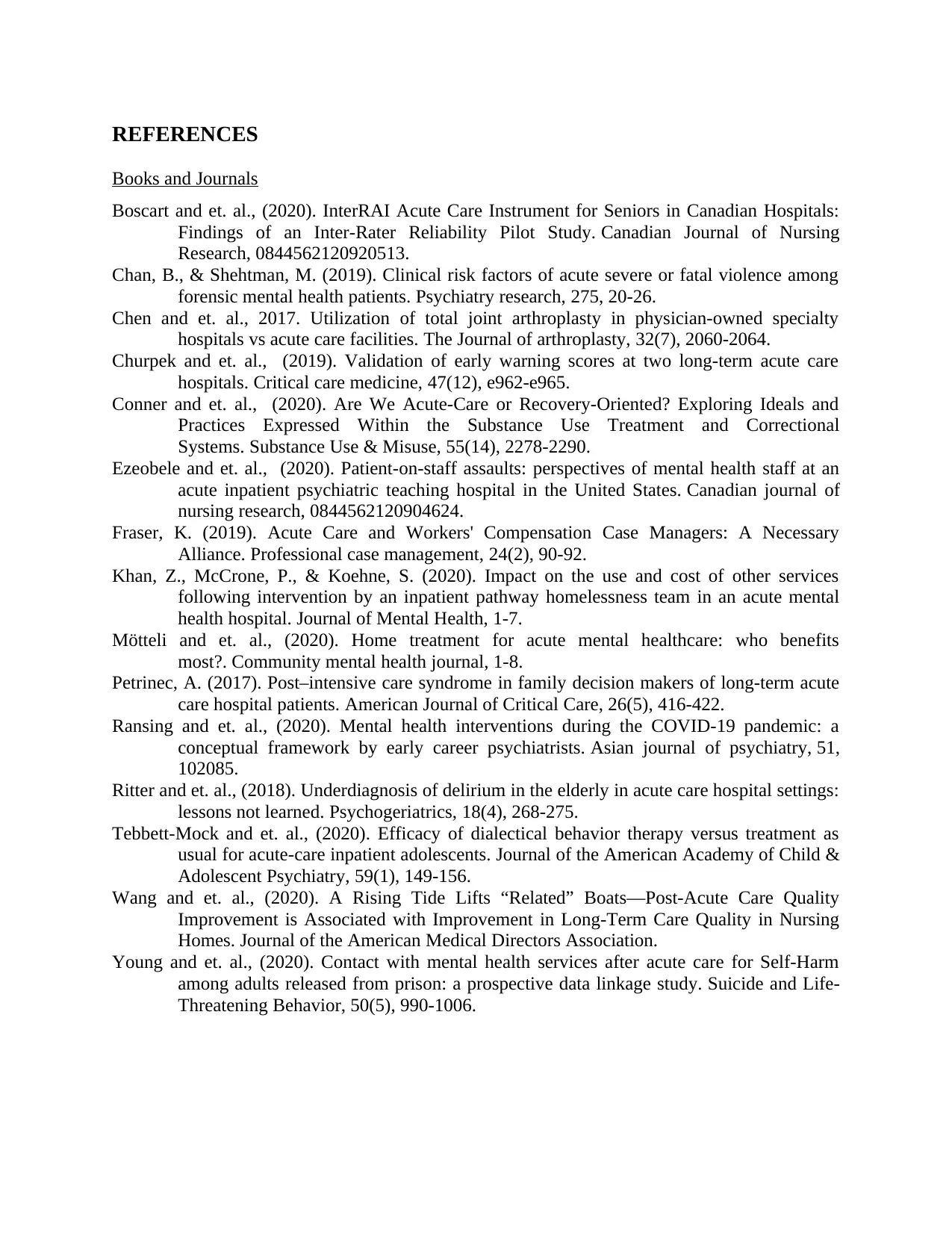
REFERENCES
Books and Journals
Boscart and et. al., (2020). InterRAI Acute Care Instrument for Seniors in Canadian Hospitals:
Findings of an Inter-Rater Reliability Pilot Study. Canadian Journal of Nursing
Research, 0844562120920513.
Chan, B., & Shehtman, M. (2019). Clinical risk factors of acute severe or fatal violence among
forensic mental health patients. Psychiatry research, 275, 20-26.
Chen and et. al., 2017. Utilization of total joint arthroplasty in physician-owned specialty
hospitals vs acute care facilities. The Journal of arthroplasty, 32(7), 2060-2064.
Churpek and et. al., (2019). Validation of early warning scores at two long-term acute care
hospitals. Critical care medicine, 47(12), e962-e965.
Conner and et. al., (2020). Are We Acute-Care or Recovery-Oriented? Exploring Ideals and
Practices Expressed Within the Substance Use Treatment and Correctional
Systems. Substance Use & Misuse, 55(14), 2278-2290.
Ezeobele and et. al., (2020). Patient-on-staff assaults: perspectives of mental health staff at an
acute inpatient psychiatric teaching hospital in the United States. Canadian journal of
nursing research, 0844562120904624.
Fraser, K. (2019). Acute Care and Workers' Compensation Case Managers: A Necessary
Alliance. Professional case management, 24(2), 90-92.
Khan, Z., McCrone, P., & Koehne, S. (2020). Impact on the use and cost of other services
following intervention by an inpatient pathway homelessness team in an acute mental
health hospital. Journal of Mental Health, 1-7.
Mötteli and et. al., (2020). Home treatment for acute mental healthcare: who benefits
most?. Community mental health journal, 1-8.
Petrinec, A. (2017). Post–intensive care syndrome in family decision makers of long-term acute
care hospital patients. American Journal of Critical Care, 26(5), 416-422.
Ransing and et. al., (2020). Mental health interventions during the COVID-19 pandemic: a
conceptual framework by early career psychiatrists. Asian journal of psychiatry, 51,
102085.
Ritter and et. al., (2018). Underdiagnosis of delirium in the elderly in acute care hospital settings:
lessons not learned. Psychogeriatrics, 18(4), 268-275.
Tebbett-Mock and et. al., (2020). Efficacy of dialectical behavior therapy versus treatment as
usual for acute-care inpatient adolescents. Journal of the American Academy of Child &
Adolescent Psychiatry, 59(1), 149-156.
Wang and et. al., (2020). A Rising Tide Lifts “Related” Boats—Post-Acute Care Quality
Improvement is Associated with Improvement in Long-Term Care Quality in Nursing
Homes. Journal of the American Medical Directors Association.
Young and et. al., (2020). Contact with mental health services after acute care for Self‐Harm
among adults released from prison: a prospective data linkage study. Suicide and Life‐
Threatening Behavior, 50(5), 990-1006.
Books and Journals
Boscart and et. al., (2020). InterRAI Acute Care Instrument for Seniors in Canadian Hospitals:
Findings of an Inter-Rater Reliability Pilot Study. Canadian Journal of Nursing
Research, 0844562120920513.
Chan, B., & Shehtman, M. (2019). Clinical risk factors of acute severe or fatal violence among
forensic mental health patients. Psychiatry research, 275, 20-26.
Chen and et. al., 2017. Utilization of total joint arthroplasty in physician-owned specialty
hospitals vs acute care facilities. The Journal of arthroplasty, 32(7), 2060-2064.
Churpek and et. al., (2019). Validation of early warning scores at two long-term acute care
hospitals. Critical care medicine, 47(12), e962-e965.
Conner and et. al., (2020). Are We Acute-Care or Recovery-Oriented? Exploring Ideals and
Practices Expressed Within the Substance Use Treatment and Correctional
Systems. Substance Use & Misuse, 55(14), 2278-2290.
Ezeobele and et. al., (2020). Patient-on-staff assaults: perspectives of mental health staff at an
acute inpatient psychiatric teaching hospital in the United States. Canadian journal of
nursing research, 0844562120904624.
Fraser, K. (2019). Acute Care and Workers' Compensation Case Managers: A Necessary
Alliance. Professional case management, 24(2), 90-92.
Khan, Z., McCrone, P., & Koehne, S. (2020). Impact on the use and cost of other services
following intervention by an inpatient pathway homelessness team in an acute mental
health hospital. Journal of Mental Health, 1-7.
Mötteli and et. al., (2020). Home treatment for acute mental healthcare: who benefits
most?. Community mental health journal, 1-8.
Petrinec, A. (2017). Post–intensive care syndrome in family decision makers of long-term acute
care hospital patients. American Journal of Critical Care, 26(5), 416-422.
Ransing and et. al., (2020). Mental health interventions during the COVID-19 pandemic: a
conceptual framework by early career psychiatrists. Asian journal of psychiatry, 51,
102085.
Ritter and et. al., (2018). Underdiagnosis of delirium in the elderly in acute care hospital settings:
lessons not learned. Psychogeriatrics, 18(4), 268-275.
Tebbett-Mock and et. al., (2020). Efficacy of dialectical behavior therapy versus treatment as
usual for acute-care inpatient adolescents. Journal of the American Academy of Child &
Adolescent Psychiatry, 59(1), 149-156.
Wang and et. al., (2020). A Rising Tide Lifts “Related” Boats—Post-Acute Care Quality
Improvement is Associated with Improvement in Long-Term Care Quality in Nursing
Homes. Journal of the American Medical Directors Association.
Young and et. al., (2020). Contact with mental health services after acute care for Self‐Harm
among adults released from prison: a prospective data linkage study. Suicide and Life‐
Threatening Behavior, 50(5), 990-1006.
Paraphrase This Document
Need a fresh take? Get an instant paraphrase of this document with our AI Paraphraser


⊘ This is a preview!⊘
Do you want full access?
Subscribe today to unlock all pages.

Trusted by 1+ million students worldwide
1 out of 9
Related Documents
Your All-in-One AI-Powered Toolkit for Academic Success.
+13062052269
info@desklib.com
Available 24*7 on WhatsApp / Email
![[object Object]](/_next/static/media/star-bottom.7253800d.svg)
Unlock your academic potential
Copyright © 2020–2025 A2Z Services. All Rights Reserved. Developed and managed by ZUCOL.





